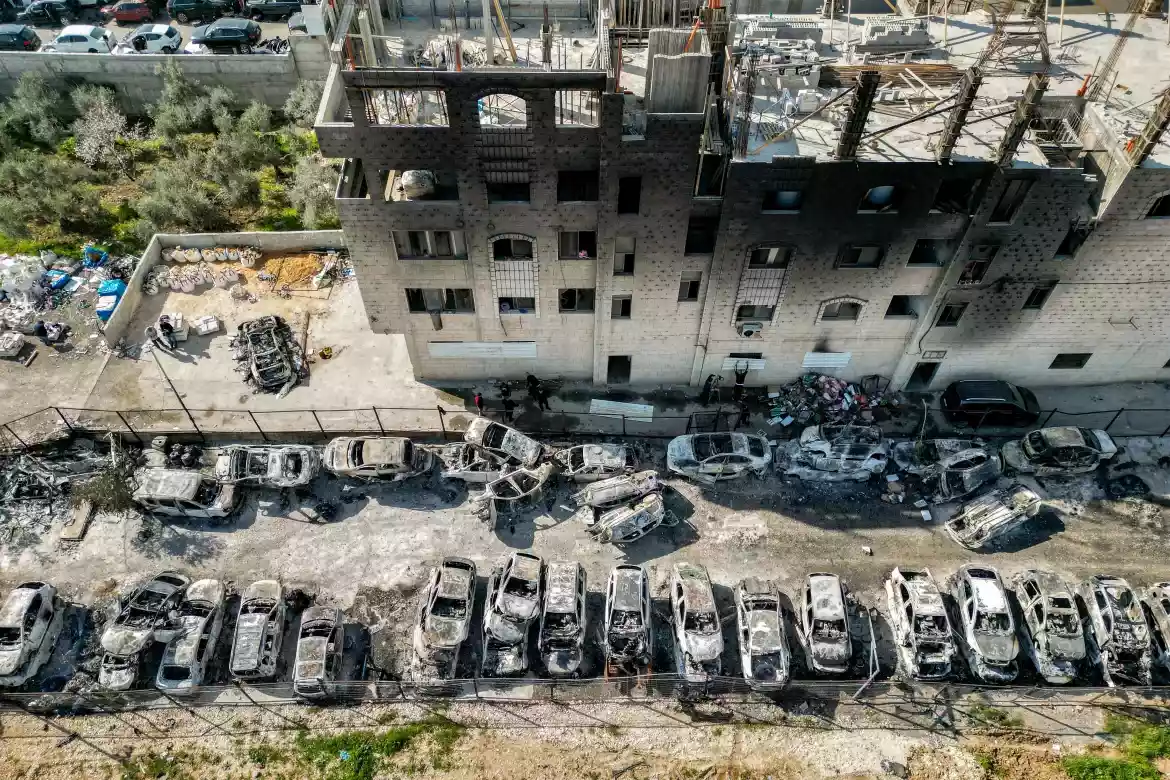
The dictionary definition of “pogrom” is “an organised massacre of a particular ethnic group, in particular that of Jewish people in Russia or eastern Europe in the late 19th and early 20th centuries”. So there is something deeply strange about hearing “pogrom” used in Hebrew to describe what some Jewish people are doing to Arabs in 21st Century Israel.
It’s one of those words, like “apartheid”, that were once seen as evidence of lurking anti-Semitism, but the dwindling fraction of Israeli Jews who still support the state’s original liberal democratic values have begun to use them about the far-right reality they now inhabit. Consider what happened in the Palestinian village of Huwara on February 26.
Huwara is in the northern West Bank. Nobody there under the age of 60 can recall a time when they didn’t live under Israeli military rule. People under 40 will remember a time where there were only a few thousand Jewish settlers in the occupied territories, but now there are about 700 000 of them.
In one sense, the “cycle of violence” between the Arab population and Jewish settlers stretches right back to the Israeli conquest of the West Bank in 1967. In more immediate terms, however, the current sequence of atrocities and counter-atrocities began with a big Israeli raid in the Palestinian city of Nablus in the week before.
The Israeli Defence Forces (IDF) were looking for three members of the local “Lion’s Den” resistance movement, but in the end 11 Palestinians were killed, at least five of whom were innocent civilians. Over a hundred were wounded.
Huwara, just south of Nablus, lies along Highway 60, the main north-south route in the West Bank, so Israeli settlers frequently drive past. On February 26, a local Palestinian gunman wearing a Lion’s Den t-shirt shot two young brothers from a nearby Jewish settlement dead after crashing into their car.
Later that day, a mob of about 400 young Israelis from the surrounding settlements went into Huwara and carried out a proper pogrom: only one Palestinian shot dead, but a hundred injured (the settlers were carrying iron bars), hundreds of cars burned and at least a hundred houses smashed up and some set on fire.
The IDF was present, but did nothing.
- Israeli pogrom in Palestine
- World View: Israel: Mowing the lawn again, but with malice aforethought
- World View: Israel: Another October war
- World View: Israel-Gaza: Better call Cicero
Keep Reading
Just another week in the occupied territories. The next intifada (Palestinian uprising) waits around the corner, and beyond that probably the next war between Israel and Hamas in the Gaza Strip. Hezbollah in southern Lebanon may also join in, with up to 150 000 fairly accurate rockets, but its Iranian backers will probably hold back.
Israel will win this round, of course, but somewhere down the road waits a possible local Armageddon. How did it end up like this? That’s mainly a question for Israel, because ever since the 1970s, it has held all the trump cards.
There have been no full-scale Arab-Israeli wars for the past half-century, because Israel had obviously become unbeatable. It could then afford to consider making a sort of negotiated peace with the Arabs, and several prime ministers tried.
The fatal obstacle was the millions of Palestinians living in the lands Israel had conquered in 1967. Giving them their own country seemed too dangerous to Israelis who were obsessed by the wars of the past. To other Israelis, who dreamed of expanding into those lands, recognising any Palestinian legal right to the land was unthinkable.
Former Israeli prime minister Yitzhak Rabin signed the Oslo peace accords that envisaged a “two-state solution” in 1993. However, he was assassinated by a hard-right Jewish assassin in 1995, and Binyamin “Bibi” Netanyahu became prime minister. Bibi has been in office for more than half the time since then, and he makes the political weather in Israel.
Netanyahu is not the captive of any particular ideology, but he has always understood that his constituency has two elements: those Israelis who still fear the Arabs, and those who lust after the occupied Arab lands and want to drive the Arabs out. That combination has made him Israel’s perma-leader and fueled the steady rightward drift of Israeli politics.
His situation went critical when he was charged with bribery, fraud and breach of trust in 2018. The evidence against him is strong and prison awaited if he could not destroy the independence of the courts. For that he needed an alliance with the far-right parties, hitherto excluded from power, because only they would share that goal with him.
After five elections in four years, Netanyahu has attained that goal and his extremist partners are helping him subordinate court decisions to government veto. In return, he will let them expand the Jewish settlements in the occupied territories very fast and crush any Arab protests ruthlessly.
Pogroms are just a natural part of this process.
Dyer is a London-based independent journalist. His new book is titled The Shortest History of War.











